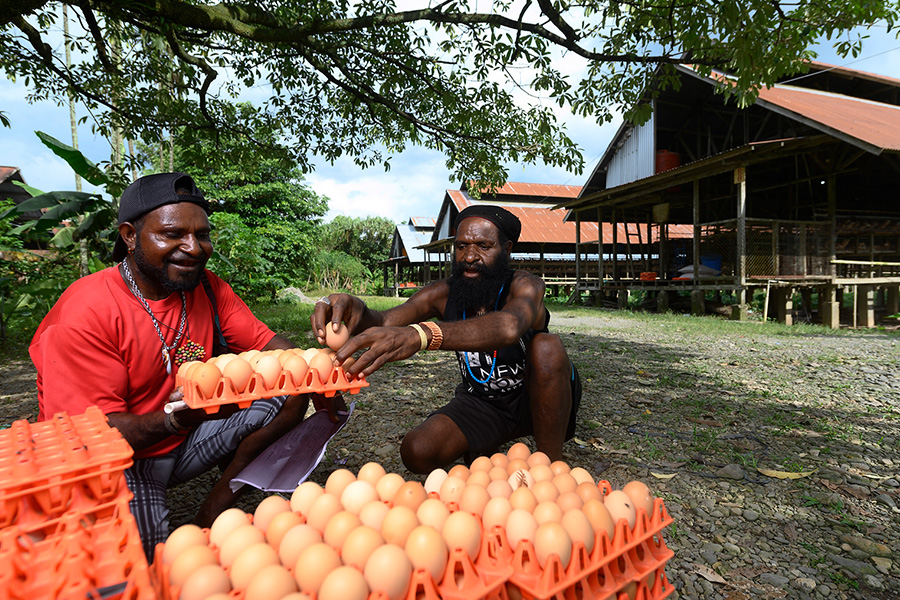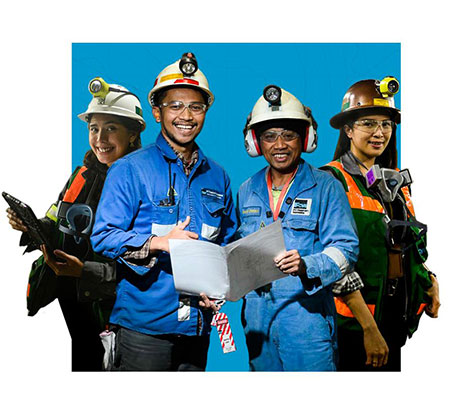05 April 2022

It was more than 50 years ago in 1967 that PT Freeport Indonesia (PTFI) set foot on Papua’s soil for the first time. Since then, Freeport has become the prime wheel of the economy not only in the mining sector but also in the empowerment of the seven communal tribes in Papua’s isolated interior surrounding Freeport’s concession.
Empowerment was not only aimed at providing economic support and welfare but also to foster independence of the indigenous Papuan population in Mimika following the end of the mining era. To materialize this, PT Freeport Indonesia and the local Mimika Administration had signed a Memorandum of Understanding to develop four plantation commodities.
The MoU between the local administration and Freeport, which took off in 2004 and is renewed every year, has just been extended for the next 3 years starting this year 2022 ending in 2024. Yohanes Bewahan, Manager Community Development PTFI, referred to this as a genuine commitment of the Mimika Administration in association with Freeport to improve the local economy and to enhance the welfare of the people of Mimika. “It is our sincere hope that in the post-mining era there will be plantation commodities and other useful products available for the people of Mimika,” Yohanes Bewahan told Timika eXpress in the Ballroom of the Hotel Cendrawasih 66 on Friday last week.
There are four main commodities the local administration in collaboration with Freeport will be developing, namely coffee, cocoa, coconut and sago. “In order to cultivate coconuts 900 hectares of land will be cleared in east and west Mimika. For the next three years Freeport will take care of transportation facilities, availability of seeds, land, the planting and the nurturing process,” Yohanes said. To plant sago 100 hectares of land will be made available in Kaugapu Village, East Mimika District. “In the context of collaboration and based on the latest discussions, Freeport will besides transportation also provide support in other fields such as the accessions of sago in Iwaka that was carried out in collaboration with the local administration,” he explains.
As far as coffee is concerned there are two types of coffee, arabica and robusta. Coffee will be cultivated on a land area of 100 hectares in three areas, Jila, Hoya and Tsinga. “There are also 500 to 700 coffee trees in Opitawak Village, Tembagapura District, but in the next three years we will invest in three locations, for which Freeport will also provide seeds and transportation. As far as land is concerned, the government will take care of that. But in the highlands, we have to deal with security,” he said.
As to the cultivation sites for cocoa, this is done alongside the entire strip of the Trans Nabire Road in Tipuka, Ayuka and Nawaripi. We have already spread the seeds. “Our collaboration will be intensified in the production process, both for coffee and cocoa. This has already been carefully planned out so that the end product like coconuts will most likely be done in collaboration with the government; this could involve products like coconut milk, coconut belts, for which we will also engage PTFI’s Environmental Division,” he said.
For this wonderful collaboration Yohanes thanked the Government for the opportunity to cultivate four commodities. “It is Freeport’s hope that the Government can be among the people because in earlier days Freeport was more or less going it alone where development of commodity programs was concerned. So, in whatever programs the Government is involved Freeport is ready to render support and commitment to help the community. We hope that later on in the post-mining era there we will be independent producers of coffee and other useful products for the community. We are proud to be able to empower and to advance the community through this collaboration with the local government
In addition, Freeport will continue to support the government in bringing programs to realization through self-reliance and community welfare Separately, Alice Irene Wanma, Head of the Department of Agriculture, Food Crops and Horticulture, Mimika Regency, said that in relation to the cultivation of four plantation commodities, the government uses the allocation of Special Autonomy (Otsis) Funds and the Regional Budget. “Our annual budget allocation amounts to IDR 800 million to cultivate the four plantation commodities,” she said.
Kami menghimbau para pencari kerja untuk berhati-hati dan mewaspadai beragam modus penipuan perekrutan yang mengatasnamakan PT Freeport Indonesia. Dalam setiap proses rekrutmen dan penerimaan karyawan, PT Freeport Indonesia maupun konsultan rekruitmennya tidak memungut biaya apapun.
Untuk melihat lowongan, silakan akses melalui link berikut: ptfi e-recruitment
Untuk melihat informasi magang, silakan akses melalui link berikut: Internship Program
